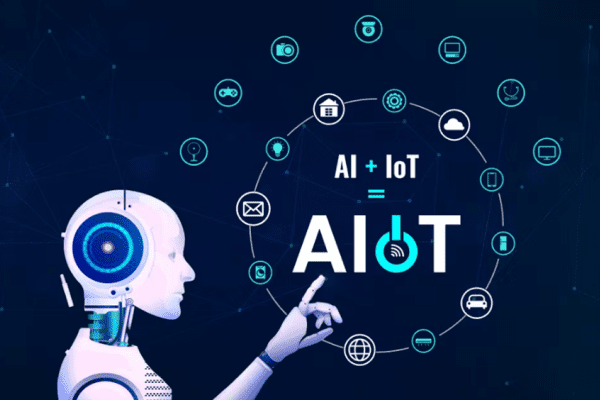No products in the cart.
Certified AIoT (AI + IoT) Engineer
₹6,500.00 ₹3,250.00
50% fee concession will end in
The course trains professionals to develop intelligent, connected AI-powered IoT solutions for automation and data-driven insights.
Description
Certification Name: Certified AIoT (AI + IoT) Engineer
Global Occupational Skill Standard – GOSS ID: GOSS/CIT/CAIE/V1
Eligibility: Graduation or Equivalent or minimum 2 years of relevant experience (experience-based learners can directly enroll and certify).
Objective: The Certified AIoT Engineer course is designed to equip professionals with the knowledge and skills to integrate Artificial Intelligence (AI) with Internet of Things (IoT) systems to create intelligent, connected solutions. The course covers IoT architecture, sensors, data acquisition, cloud platforms, AI algorithms, machine learning, predictive analytics, and real-time decision-making.
Certification: Within 5 days after Completion of Online Assessment.
Get ready to join the Journey to become a GSDCI Certified Professional – International Certification and Assessment Body.
Steps to become a GSDCI Certified Professional:
Step 1: Select your certification you want to pursue.
Step 2: Click on get certified tab, new pop up window will open.
Step 3: Click on pay certification fee, you will be redirected to billing details page.
Step 4: Fill your details and click on pay certification fee, you will be redirected to payment gateway, pay fee by any available options like Card (Debit/Credit), Wallet, Paytm, Net banking, UPI and Google pay.
Step 5: You will get Login Credentials of Online E-Books and Online assessment link on your email id, within 48 hrs of payment.
Step 6: After completion of online assessment, you can download your Certificate Immediately.
Assessment Modules:
Module 1 – AIoT Foundations & Ecosystem: Introduction to AIoT: combining AI and IoT, IoT architecture and components (sensors, actuators, connectivity), Fundamentals of Artificial Intelligence and Machine Learning, Edge vs cloud computing in AIoT, Business models and use‑cases of AIoT (smart homes, smart industry, healthcare), Technical and organisational challenges in AIoT deployments
Module 2 – IoT Hardware, Connectivity & Data Acquisition: Sensor and actuator technologies, embedded systems and microcontrollers for IoT, Communication protocols and standards (MQTT, CoAP, HTTP, LoRaWAN, NB‑IoT), Network topologies, gateways, edge devices and connectivity architectures, Data acquisition, filtering, pre‑processing on device/edge, Device management, firmware updates and life‑cycle management
Module 3 – Data Engineering & AI for IoT: Data ingestion and storage architectures for IoT (streams, batch, edge caching), Data modelling, cleaning and transformation for IoT telemetry and sensor data, Machine learning algorithms for IoT data (classification, regression, clustering, anomaly detection), Deep learning and reinforcement learning for edge/IoT environments, Real‑time analytics and streaming processing for IoT, AI model deployment on edge and resource‑constrained devices
Module 4 – AIoT System Design & Integration: Architecting AIoT systems: end‑to‑end design from device to cloud, Edge‑to‑cloud continuum and hybrid architectures, Integration of IoT platforms, AI/ML pipelines and application services, Security, privacy and identity management in AIoT systems, Interoperability, standardisation and APIs in AIoT ecosystems, Testing, simulation, validation and performance benchmarking of AIoT solutions
Module 5 – Deployment, Monitoring & Maintenance of AIoT Solutions: Deployment workflows: device provisioning, network setup, configuration management and CI/CD for IoT/AI pipelines, Monitoring, logging and observability of AIoT systems (device health, model performance, latency, data quality), Maintenance strategies: remote updates, model retraining, drift detection, lifecycle of sensors/devices, Scalability, fault‑tolerance and resilience in distributed AIoT deployments, Cost‑management, energy‑efficiency and edge resource optimisation
Module 6 – Use‑Cases, Governance, Ethics & Emerging Trends in AIoT: Industry vertical use‑cases: smart manufacturing (IIoT), smart cities, healthcare wearables, agriculture, transportation, Governance, regulation and ethical considerations in AIoT (data privacy, bias, autonomy, safety), Security threats specific to AIoT and mitigation strategies (device compromise, adversarial ML, network attacks), Future trends: digital twins, federated learning at edge, 5G/6G and IoT, IoT + AI for autonomous systems and robotics, Business strategy, innovation and scaling AIoT in enterprises
GSDCI Online Assessment Detail:
- Duration- 60 minutes.
- Number of Questions- 30.
- Number of Questions from each module: 5.
- Language: English.
- Exam Type: Multiple Choice Questions.
- Maximum Marks- 100, Passing Marks- 50%.
- There is no negative marking in any module.
| Marking System: | |||
| S.No. | No. of Questions | Marks Each Question | Total Marks |
| 1 | 10 | 5 | 50 |
| 2 | 5 | 4 | 20 |
| 3 | 5 | 3 | 15 |
| 4 | 5 | 2 | 10 |
| 5 | 5 | 1 | 5 |
| 30 | 100 | ||
| How Students will be Graded: | |||
| S.No. | Marks | Grade | |
| 1 | 91-100 | O (Outstanding) | |
| 2 | 81-90 | A+ (Excellent) | |
| 3 | 71-80 | A (Very Good) | |
| 4 | 61-70 | B (Good) | |
| 5 | 50-60 | P (Pass) | |
| 6 | 0-49 | F (Fail) | |
Benefits of Certification:
🌍 1. Global Recognition & Credibility – Stand out worldwide with a certification that opens doors across borders. Trusted by employers, respected by institutions, and recognized in over 100 countries.
📜 2. Quality Assurance through ISO Certification – Certified to global ISO standards, our programs deliver excellence, consistency, and a benchmarked learning experience that speaks for itself.
💼 3. Career Advancement & Employability – Enhances your resume and increases chances of promotions or job offers.
🤝 4. Non-Profit Trust Factor – Certifications from non-profit organizations are mission-driven rather than profit-driven.
📚 5. Access to Verified Learning & Resources – Often includes e-books, mock tests, and online support without hidden costs.
🔍 6. Transparency & Online Verification – Certifications come with a unique Enrolment ID for easy online verification by employers and institutions.
⏳ 7. Lifetime or Long-Term Validity – Certifications usually have lifetime validity or long-term recognition, reducing the need for frequent renewals.
